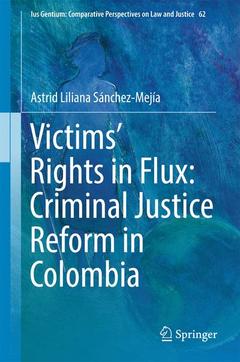Victims' Rights in Flux: Criminal Justice Reform in Colombia, Softcover reprint of the original 1st ed. 2017 Ius Gentium: Comparative Perspectives on Law and Justice Series, Vol. 62
Auteur : Sánchez-Mejía Astrid Liliana

Explores how the adoption of adversarial systems in Latin America has affected victims’ rights by specifically analyzing the Colombian criminal justice reform
Sheds vital new light on the understanding of victims’ rights in criminal proceedings
Provides a unique treatment for readers interested in victims’ rights in the criminal process, employing a range of theoretical traditions and tools
Presents an innovative, empirical assessment of the rights of crime victims following the adversarial criminal justice reform in Colombia
Includes supplementary material: sn.pub/extras
Date de parution : 07-2017
Ouvrage de 265 p.
15.5x23.5 cm
Disponible chez l'éditeur (délai d'approvisionnement : 15 jours).
Prix indicatif 147,69 €
Ajouter au panierDate de parution : 08-2018
Ouvrage de 265 p.
15.5x23.5 cm
Disponible chez l'éditeur (délai d'approvisionnement : 15 jours).
Prix indicatif 147,69 €
Ajouter au panier


